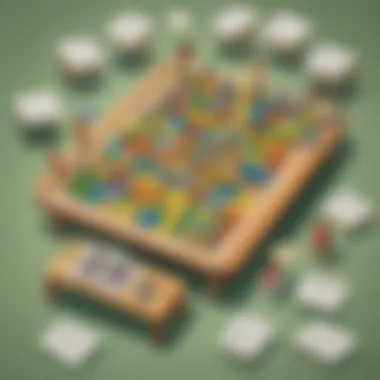Unlocking the Magic of Multiplication Tables: Exciting Learning Strategies


Science Fun Facts
Did you know that understanding multiplication tables is crucial for building a solid foundation in mathematics? These tables help us quickly calculate outcomes of numerical operations and see patterns in numbers, making math easier and more enjoyable. By learning and mastering multiplication, students can enhance their problem-solving skills and mathematical fluency.
Discover the Wonders of Mathematics
When it comes to learning multiplication tables, there are various innovative ways to engage and excite young learners. From using colorful flashcards and interactive apps to playing educational games and organizing math challenges, children can explore the world of mathematics in a fun and stimulating manner. By integrating real-life examples and practical applications, students can see the relevance of multiplication in everyday scenarios.
Math Quiz Challenge
Are you ready for a math quiz that will put your multiplication skills to the test? Dive into interactive quizzes, solve brain teasers, and tackle tricky math puzzles to reinforce your knowledge of multiplication tables. From basic multiplication facts to more complex problems, these quizzes offer a fun and engaging way to sharpen your mathematical abilities and boost your confidence in working with numbers.
Multiplication Magic Experiments
Unlock the magic of multiplication through exciting hands-on experiments! Explore the concept of multiplication through visual demonstrations, hands-on activities, and engaging STEM projects. From creating multiplication arrays with everyday objects to conducting fun multiplication games, these experiments offer a unique and immersive learning experience that brings math to life.
Introduction
In the vast realm of learning, the mastery of multiplication tables stands as a crucial cornerstone that lays the foundation for a child's mathematical journey. The significance of grasping multiplication tables effortlessly transcends mere numbers; it nurtures a child's reasoning, problem-solving skills, and analytical thinking right from the early educational stages. By cultivating a strong understanding of multiplication, children develop a robust mathematical framework that not only aids in arithmetic but also extends to various facets of life where critical thinking plays a pivotal role.
Moreover, delving into the landscape of learning multiplication tables opens a world of opportunities for enhancing cognitive skills such as memory retention, pattern recognition, and logical reasoning. This key educational element not only sharpens young minds but also equips them with essential tools to tackle complex mathematical problems with confidence and precision. It instills a sense of numerical fluency that can bolster a child's academic performance across diverse subjects, laying a solid groundwork for future academic pursuits.
Beyond its academic merits, mastering multiplication tables instills a sense of accomplishment and self-assurance in children, fostering a positive attitude towards learning and intellectual growth. The ability to effortlessly recall multiplication facts not only boosts a child's confidence in math but also cultivates a sense of resilience and tenacity when encountering challenging problems. This adaptive mindset nurtured through learning multiplication tables fosters a lifelong love for learning and a proactive approach towards overcoming academic hurdles.
In essence, the journey of learning multiplication tables transcends rote memorization; it embodies a profound exploration of numerical patterns, logical connections, and cognitive processes that shape a child's holistic development. By embracing the fun ways to master multiplication tables, children embark on an enriching educational voyage filled with discovery, empowerment, and the joy of intellectual growth.
Importance of Learning Multiplication Tables
In the realm of mathematics, mastering multiplication tables stands as a foundational skill set that lays the groundwork for more advanced mathematical concepts. Understanding multiplication not only aids in rapid calculations but also enhances problem-solving abilities. Proficiency in multiplication is akin to unlocking a treasure trove of numerical fluency, empowering individuals to navigate mathematical challenges with confidence and accuracy. For elementary school children, learning multiplication tables serves as a stepping stone towards developing analytical thinking and critical reasoning skills. By grasping multiplication concepts early on, students can streamline their learning trajectory and approach more complex math topics with proficiency.
Moreover, the significance of learning multiplication tables extends beyond academic realms. The practical applications of multiplication are ubiquitous in daily life, from calculating prices during shopping trips to determining ingredient quantities in recipes. By cultivating a strong foundation in multiplication, children acquire a practical life skill that is indispensable in various real-world scenarios. Additionally, mastering multiplication tables fosters a deeper appreciation for the logical and systematic nature of mathematics, instilling a sense of discipline and precision in problem-solving approaches.
In the context of education, the ability to recall multiplication facts swiftly enhances overall computational efficiency. Quick mental calculations not only save time but also boost students' confidence in their math abilities. Understanding multiplication tables facilitates a deeper comprehension of number relationships and patterns, strengthening mathematical fluency. This fluency, in turn, nurtures a positive attitude towards learning math and cultivates a growth mindset where challenges are viewed as opportunities for growth and development.
Furthermore, proficiency in multiplication tables lays a solid groundwork for more advanced math concepts such as algebra and calculus. The analytical thinking and problem-solving skills honed through the learning of multiplication contribute to a robust mathematical skill set that is invaluable in higher education and professional pursuits. As such, investing time and effort in mastering multiplication tables at a young age paves the way for future academic and career success, setting a strong academic foundation for lifelong learning and growth.
Visual Representation Techniques


Visual representation techniques play a pivotal role in aiding individuals, especially elementary school children, in grasping complex concepts such as multiplication tables. By employing visual aids, learners can enhance their understanding through concrete visuals that simplify abstract mathematical ideas. Whether using arrays, grids, color-coding strategies, or interactive flashcards, visual representations serve as powerful tools to reinforce numerical relationships and patterns.
Using Arrays and Grids
When delving into the realm of visual representation techniques, arrays and grids emerge as fundamental tools. Arrays present multiplication facts in a structured layout that showcases the systematic progression of numbers, facilitating a clear visualization of the multiplication process. By organizing numbers in rows and columns, arrays help students identify patterns and connections, promoting a deeper comprehension of multiplication.
Color-Coding Strategies
Color-coding strategies offer an innovative approach to associating numbers with visual cues, enhancing memory retention and recall. By assigning specific colors to different numbers or patterns within multiplication tables, learners can create a visually stimulating and memorable learning experience. This technique leverages the psychological impact of colors to create meaningful associations, making multiplication tables more engaging and easier to memorize.
Interactive Flashcards
Interactive flashcards provide an engaging platform for practicing multiplication tables while incorporating elements of gamification. Through interactive features such as drag-and-match exercises or timed challenges, flashcards transform traditional memorization drills into dynamic learning experiences. By engaging with flashcards, students can test their knowledge, receive immediate feedback, and track their progress in mastering multiplication facts.
Gamified Learning Approaches
Gamified learning approaches play a significant role in enhancing children's engagement and motivation when learning multiplication tables. By infusing elements of games, challenges, and rewards into the educational process, students are more likely to stay focused and enthusiastic about their mathematical studies. The competitive nature of gamification encourages active participation and boosts retention of multiplication facts. Additionally, the element of fun introduced through gamified learning can alleviate the monotony typically associated with repetitive drills, making the learning experience enjoyable and effective.
Multiplication Bingo
Multiplication Bingo is a dynamic and entertaining way to reinforce multiplication skills while fostering an atmosphere of camaraderie among students. In this game, players are required to solve multiplication problems presented in a bingo format, adding an element of suspense and excitement to the learning process. By actively engaging with the numerical challenges in a social setting, children not only enhance their multiplication proficiency but also improve their strategic thinking and mental math abilities. The interactive nature of Multiplication Bingo ensures that learning becomes a collaborative and stimulating activity, promoting teamwork and healthy competition among peers.
Mathematical Puzzles and Riddles
Integrating mathematical puzzles and riddles into the curriculum provides students with brain-teasing challenges that sharpen their problem-solving skills while reinforcing multiplication concepts. By presenting multiplication facts in a puzzle or riddle format, children are encouraged to think critically and creatively to arrive at the correct solutions. This approach not only makes learning engaging and intriguing but also cultivates a sense of curiosity and persistence in tackling mathematical problems. Mathematical puzzles and riddles serve as mental exercises that enhance cognitive abilities and develop a deep understanding of multiplication principles in a playful and intellectually stimulating manner.
Online Multiplication Games
Online multiplication games offer a modern and interactive platform for children to practice and improve their multiplication abilities in an engaging virtual environment. These games leverage technology to create immersive experiences that combine entertainment with educational value, motivating students to hone their math skills while having fun. By providing instant feedback and progress tracking, online multiplication games allow children to monitor their performance and set achievable goals for improvement. The interactive nature of these games captures the attention of young learners, encouraging regular practice and skill development in a dynamic and rewarding context.
Real-Life Application Exercises
Learning multiplication tables through real-life application exercises is a strategic approach designed to enhance understanding and retention. By connecting mathematical concepts to everyday scenarios, students can grasp the practical significance of multiplication in their lives. These exercises serve as bridges between theoretical knowledge and practical use, strengthening the foundation of mathematical skills. Engaging in real-life applications cultivates problem-solving abilities and promotes critical thinking, essential skills for a holistic mathematical education.
Supermarket Multiplication Scavenger Hunt
Incorporate the excitement of a scavenger hunt into learning mathematical concepts at the supermarket. Guide students to identify products with price tags displaying multiplication equations. Encourage them to calculate the total cost of items or determine the best value for money. By applying multiplication in a real-world setting, children not only practice their math skills but also develop financial literacy and decision-making skills. This activity fosters a deep understanding of the relevance of multiplication in daily tasks, making learning both educational and engaging.


Cooking Measurements Practice
Engage children in learning multiplication tables through practical experiences in the kitchen. Assign tasks that require measuring ingredients using different measuring tools. Encourage accurate multiplication and conversion of units while preparing recipes. This hands-on approach not only reinforces multiplication skills but also enhances spatial awareness and measurement proficiency. Connecting math to cooking instills a sense of independence and responsibility in children while honing their arithmetic abilities in a fun and interactive manner.
DIY Crafts with Multiplication Facts
Incorporating multiplication facts into do-it-yourself (DIY) craft projects can make learning more enjoyable and memorable for children. Create craft activities that involve counting and multiplying to determine quantities of materials needed. By engaging in creative projects, students can visualize the practical applications of multiplication. Crafting with multiplication facts not only boosts mathematical skills but also cultivates patience, attention to detail, and creativity. This hands-on approach to learning multiplication tables sparks joy and adds an artistic dimension to mathematical education.
Incorporating Technology Tools
In today's digital age, the integration of technology tools in the educational domain is paramount, even when tackling subjects as fundamental as multiplication tables. Incorporating technology presents a myriad of benefits for young learners, offering a dynamic and interactive approach to mastering mathematical concepts. By infusing technology into the learning process, students can cultivate a deeper understanding of multiplication tables through visual aids, interactive exercises, and engaging platforms.
Technology tools provide a versatile learning environment that caters to diverse learning styles. This flexibility allows students to choose the methods that best suit their individual preferences, promoting a personalized learning experience. Moreover, technology tools can adapt to the pace of each student, ensuring that concepts are grasped at a comfortable and efficient rate.
When considering the incorporation of technology tools, it is essential to evaluate the age-appropriateness and educational value of the chosen applications. Ensuring that the tools are engaging, intuitive, and aligned with curriculum objectives is key to maximizing their impact on learning outcomes. Additionally, understanding the technical requirements and potential challenges of using technology tools can help educators and parents facilitate a seamless integration process for students.
Educational Multiplication Apps
Educational multiplication apps serve as powerful resources in enhancing students' arithmetic skills. These apps transform the learning experience into a dynamic and engaging journey, allowing students to practice multiplication tables in a gamified setting. Through interactive quizzes, progress tracking features, and immediate feedback mechanisms, educational multiplication apps motivate students to improve their mathematical abilities while enjoying the learning process.
Structured to cater to various skill levels, these apps support both beginners and advanced learners in mastering multiplication tables at their own pace. The visual and auditory components of educational multiplication apps enhance retention and comprehension, making complex mathematical concepts more accessible and enjoyable for young minds.
To leverage the full potential of educational multiplication apps, it is crucial to explore diverse options that align with the educational objectives and learning preferences of students. By integrating these apps into daily practice routines, students can solidify their multiplication skills, build confidence in problem-solving, and develop a positive attitude towards mathematics.
Online Tutorials and Videos
In the realm of online tutorials and videos, students have access to a wealth of resources that cater to different learning styles and preferences. These multimedia tools offer step-by-step guidance, visual demonstrations, and real-world applications of multiplication concepts, enriching the learning experience beyond traditional methods.
Online tutorials provide a structured approach to learning multiplication tables, breaking down complex concepts into digestible units. Through clear explanations and visual aids, students can reinforce their understanding of multiplication principles and techniques. Additionally, interactive exercises and self-assessment quizzes empower students to gauge their progress and identify areas for improvement.
Videos related to multiplication tables bring abstract concepts to life through engaging visuals and practical examples. Whether through animated explanations, real-life scenarios, or interactive demonstrations, these videos stimulate interest and curiosity, nurturing a deeper connection to mathematical concepts. By incorporating online tutorials and videos into the educational journey, students can enhance their problem-solving skills and critical thinking abilities in a captivating and immersive manner.
Virtual Reality Math Simulations
The integration of virtual reality (VR) math simulations revolutionizes the learning experience by transporting students into immersive mathematical environments. Through VR technology, students can interact with virtual objects, manipulate numerical data, and visualize multiplication concepts in three-dimensional space. This hands-on approach enhances spatial reasoning skills and fosters a deeper understanding of abstract mathematical ideas.
VR math simulations bridge the gap between theoretical knowledge and practical application, offering a unique perspective on multiplication tables. By engaging with virtual scenarios that require multiplication computations, students develop problem-solving strategies, spatial awareness, and mathematical fluency. The interactive nature of VR simulations leverages gamification elements to make learning enjoyable and impactful.


To optimize the benefits of virtual reality math simulations, educators and parents should ensure access to quality VR resources that are age-appropriate and align with educational objectives. Supervision and guidance during VR sessions are essential to provide support and facilitate meaningful learning experiences. By immersing students in VR math simulations, educators can foster a profound appreciation for mathematics and instill a lifelong passion for learning.
Engaging Peer Interaction Methods
Engaging peer interaction methods play a vital role in enhancing the learning experience of children when it comes to mastering multiplication tables. By fostering collaborative learning environments, students can stimulate their cognitive abilities and reinforce their understanding of mathematical concepts in a social context. Peer interaction not only cultivates a sense of camaraderie but also allows youngsters to learn from each other's perspectives and approaches, encouraging a diverse range of problem-solving strategies. Emphasizing engaging peer interaction methods in this article underscores the significance of social learning dynamics in educational settings and how group activities can strengthen mathematical skills. The benefits of peer interaction extend beyond academic achievements, promoting teamwork, communication proficiency, and empathy among students.
Group Multiplication Challenges
Group multiplication challenges inject an element of excitement and friendly competition into the learning process, motivating children to actively participate and master multiplication tables collaboratively. By dividing students into teams and presenting them with varying levels of challenges, educators can cater to different learning paces and preferences, ensuring inclusivity and engagement for all participants. These challenges not only enhance mathematical skills but also foster a sense of unity and teamwork among children, promoting a supportive and interactive learning environment. Through group multiplication challenges, students can develop critical thinking abilities, logical reasoning skills, and effective communication, all essential components for academic and personal growth.
Peer Teaching Sessions
Peer teaching sessions empower students to take on the role of educators, allowing them to explain multiplication concepts to their peers in a simplified and relatable manner. This approach not only consolidates the teacher's understanding of the subject matter but also enhances the student's grasp of multiplication principles through active teaching and learning interactions. Peer teaching sessions promote a collaborative learning atmosphere where knowledge is shared organically, leading to comprehensive comprehension and retention of multiplication facts. Encouraging students to become peer teachers nurtures leadership skills, boosts self-confidence, and reinforces the idea that everyone has something valuable to contribute to the learning process.
Multiplication Table Competitions
Multiplication table competitions provide a dynamic platform for students to showcase their proficiency in multiplication, fostering a spirit of healthy competition and academic excellence. By organizing fun and interactive competitions, educators can create a stimulating learning environment that motivates children to sharpen their mathematical skills while enjoying the thrill of friendly rivalry. These competitions not only enhance mathematical competency but also instill a sense of achievement and recognition among students, boosting their self-esteem and morale. Through multiplication table competitions, students can test their knowledge, improve problem-solving abilities, and celebrate their progress, creating a positive attitude towards learning and academic challenges.
Enhancing Memory Retention Techniques
In this insightful section dedicated to Enhancing Memory Retention Techniques, we delve into a crucial aspect of the learning process. Memory retention is vital because it determines how effectively students can recall and apply multiplication facts. By understanding various strategies to enhance memory, students can develop a solid foundation in mathematics.
Mnemonic Devices for Multiplication Facts
In the realm of mnemonic devices for multiplication facts, creativity meets functionality. Mnemonics are memory aids that help associate information with easier-to-remember cues. For multiplication tables, mnemonic devices can range from rhymes and acronyms to visual imagery that connects numbers in a memorable way. For example, associating the number 6 with the shape of a bug that helps remember the 6 times table. Mnemonic devices not only aid in quicker recall but also make studying multiplication tables an engaging and enjoyable experience for students.
Repetition and Practice Strategies
Repetition and practice form the backbone of effective learning in mathematics. In this context, repetition refers to the act of revisiting multiplication tables regularly to reinforce memory. Practice, on the other hand, involves actively engaging with multiplication problems to improve accuracy and speed. By incorporating regular repetition and targeted practice sessions into their study routine, students can consolidate their knowledge of multiplication tables and build confidence in their mathematical abilities. It is essential to strike a balance between repetition and practice to ensure steady progress and long-term retention of multiplication facts.
Memory Games with Multiplication Tables
Memory games add an element of fun and challenge to the process of learning multiplication tables. These games utilize cognitive skills like memorization, pattern recognition, and recall to enhance memory retention. Activities like matching games, card games, and puzzles can be adapted to focus on multiplication facts, making learning an interactive and enjoyable experience. By gamifying the memorization process, students are more likely to stay motivated and engaged, leading to improved retention of multiplication tables. Memory games provide a refreshing break from traditional study methods and offer a hands-on approach to mastering multiplication facts.
Conclusion
In concluding this comprehensive guide on innovative ways to learn multiplication tables, it is vital to emphasize the overarching benefits and significance of mastering this fundamental mathematical skill. Understanding multiplication lays a solid foundation for advanced mathematical concepts and real-world applications. By delving into the world of multiplications, students enhance their problem-solving abilities and critical thinking skills. Moreover, proficient knowledge of multiplication tables facilitates quicker mental calculations and boosts overall mathematical confidence. Thus, incorporating engaging and fun methods into the learning process not only cultivates a positive attitude towards mathematics but also nurtures a sense of accomplishment and progress.
Further reflection reveals that the interactive and creative approaches discussed throughout this article serve as a bridge between abstract numerical operations and practical, real-life scenarios. By integrating visual representations, gamified learning approaches, real-life application exercises, technological tools, peer interactions, and memory retention techniques, children can grasp multiplication concepts in a holistic and experiential manner. This holistic learning experience not only aids in memorization but also fosters a deep understanding of the underlying principles of multiplication. It promotes active engagement, motivates continuous practice, and fortifies retention, transforming the often-dreaded task of memorizing tables into an enjoyable and rewarding educational journey.
Examining the nuances of each section elucidates the multifaceted nature of learning multiplication tables. From utilizing arrays and grids to incorporating mnemonic devices and peer teaching sessions, each strategy caters to different learning styles and cognitive preferences. By offering a diverse array of learning modalities, this article empowers educators, parents, and students to tailor approaches according to individual needs, ensuring a personalized and effective learning experience. The amalgamation of traditional teaching methods with modern technological advancements highlights the adaptability and evolution of educational practices, reflecting a dynamic and responsive approach towards nurturing young minds in an ever-changing world.
In essence, the journey to mastering multiplication tables transcends rote memorization; it encompasses a holistic educational experience that enriches not only mathematical proficiency but also cognitive development, problem-solving skills, and creative thinking. By embracing fun and interactive learning methodologies, children embark on a rewarding exploration of numerical relationships and multiplicational structures, paving the way for a lifelong appreciation of mathematics and intellectual growth.







